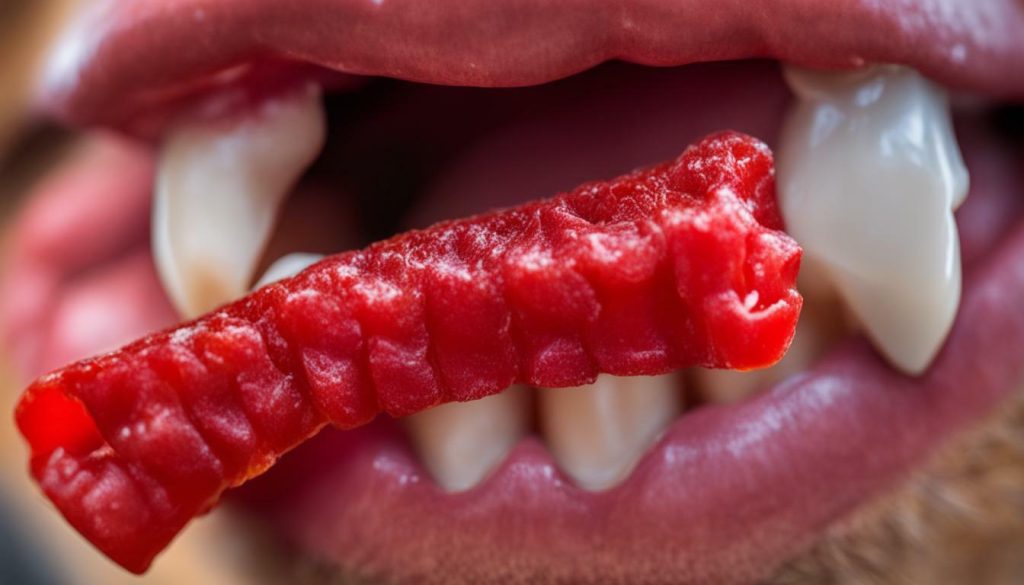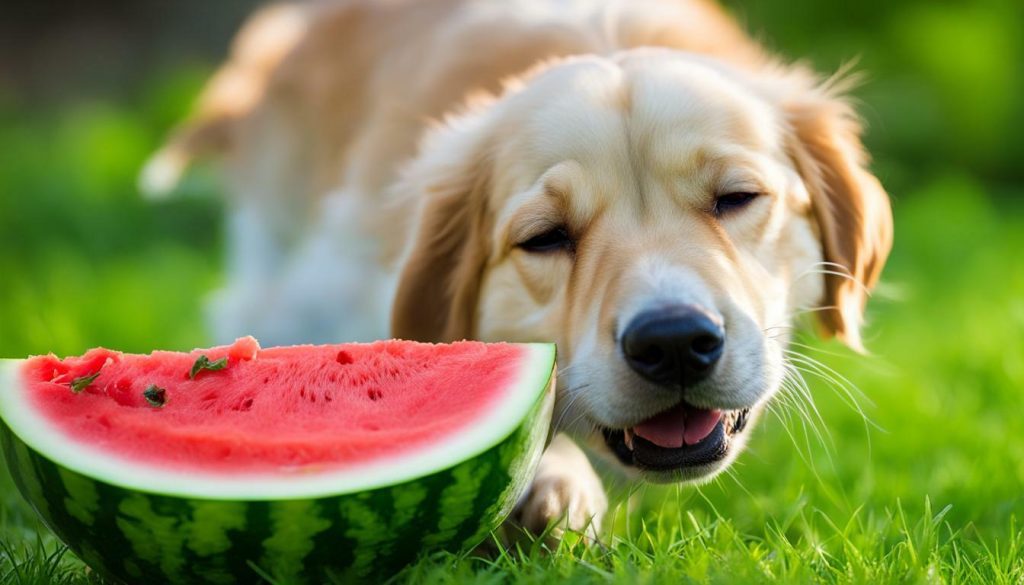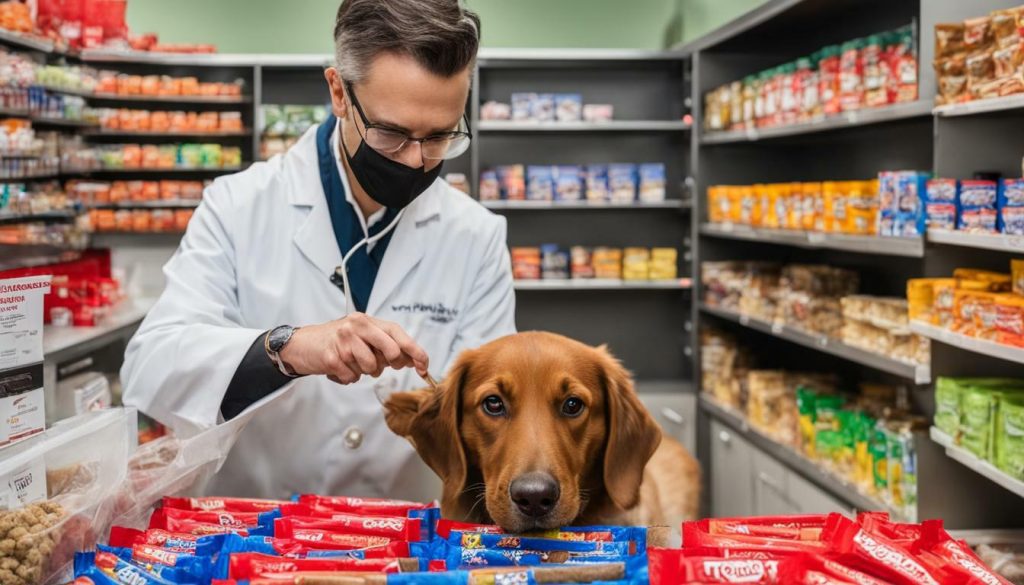
If you’ve ever wondered, “Can dogs eat Twizzlers?” you’re not alone. In this guide, we will explore the safety of giving Twizzlers to our furry friends and provide alternative snack options that are more suitable for their health.
- Twizzlers are not recommended for dogs due to their high sugar content and harmful ingredients.
- Regular consumption of Twizzlers can lead to obesity, dental problems, diabetes, and other health issues for dogs.
- Black licorice Twizzlers contain a compound called glycyrrhizin that can increase blood pressure in both humans and dogs.
- It is best to choose dog-friendly treats and consult with a veterinarian for guidance on safe snacks for your pet.
- Alternative snack options for dogs include natural fruit snacks, dog-specific treats, and homemade treats prepared with pet-friendly ingredients.
Understanding the Risks of Twizzlers for Dogs
Before sharing a Twizzler with your canine companion, it’s important to understand the potential risks involved. Twizzlers contain high amounts of sugar and other ingredients that can be harmful to dogs, leading to various health problems in the long run. While a small piece of Twizzler may not immediately harm your dog, regular consumption can have detrimental effects on their overall health.
The primary concern with Twizzlers is their high sugar content. Dogs do not process sugar as efficiently as humans do, which can lead to obesity, dental problems, and even diabetes. Excessive sugar consumption can contribute to weight gain and increase the risk of developing other health conditions. Therefore, it is best to avoid giving Twizzlers to your furry friend.

Additionally, black licorice Twizzlers pose a specific risk to dogs due to a compound called glycyrrhizin. This compound can not only cause digestive upset but may also lead to an increase in blood pressure. It is crucial to note that both humans and dogs can be affected by glycyrrhizin, making it necessary to keep black licorice Twizzlers away from your pet.
To ensure the health and well-being of your dog, it is recommended to opt for dog-friendly treats that are specifically formulated to meet their nutritional needs. Natural fruit snacks, dog-specific treats, and homemade treats made with dog-safe ingredients are excellent alternatives to Twizzlers. Prioritize your pet’s health by consulting with a veterinarian for personalized advice on safe and appropriate snacks for your beloved furry companion.
| Key Points | |
|---|---|
| 1. | Twizzlers contain high amounts of sugar that can lead to obesity, dental problems, and diabetes in dogs. |
| 2. | Black licorice Twizzlers contain glycyrrhizin, a compound that can increase blood pressure and pose risks to both humans and dogs. |
| 3. | Opt for dog-friendly treats that meet your pet’s nutritional needs, and consult with a veterinarian for personalized advice. |
The Dangers of Sugar for Dogs
Sugar may be a sweet indulgence for humans, but for dogs, it can have serious consequences. Regularly consuming sugary treats like Twizzlers can lead to obesity, dental problems, and even diabetes in our furry friends. The high sugar content in Twizzlers can contribute to weight gain and put strain on a dog’s joints and organs, increasing their risk of developing conditions like arthritis and heart disease.
“Excess sugar can also wreak havoc on a dog’s dental health,” warns Dr. Sarah Johnson, a veterinarian specializing in pet nutrition. “The sticky nature of Twizzlers can cling to a dog’s teeth, promoting the growth of harmful bacteria and leading to decay and gum disease.”
In addition to these immediate risks, long-term exposure to sugar can disrupt a dog’s metabolism, potentially leading to insulin resistance and diabetes. Diabetes in dogs can cause symptoms such as increased thirst, frequent urination, weight loss, and even blindness or kidney failure if left untreated.
To ensure the well-being of our canine companions, it is important to be mindful of their dietary needs and avoid exposing them to unnecessary health risks. While the occasional small piece of Twizzler may not cause harm, it is best to opt for dog-friendly treats that are specifically formulated with their nutritional requirements in mind.

| Treat Options | Description |
|---|---|
| Natural Fruit Snacks | These treats provide a sweet and healthy alternative to sugary snacks like Twizzlers. Apples, bananas, and blueberries are all examples of dog-safe fruits that can make for delicious and nutritious treats. |
| Dog-Specific Treats | There are many dog treats available on the market that are designed to meet a dog’s nutritional needs. Look for treats that are low in sugar, made with wholesome ingredients, and approved by veterinarians. |
| Homemade Treats | If you prefer to make your own treats, there are plenty of recipes available online using dog-friendly ingredients like pumpkin, peanut butter, and oats. Just be sure to avoid ingredients that can be toxic to dogs, such as chocolate or xylitol. |
Remember, the health and well-being of our dogs should always be a top priority. By understanding the dangers of sugar and making informed choices regarding their diet and treats, we can help our four-legged friends live long, happy, and healthy lives.
The Glycyrrhizin Dilemma: Black Licorice Twizzlers
Black licorice Twizzlers stand out from the rest due to the presence of a compound called glycyrrhizin, which poses a risk to both humans and dogs by potentially increasing blood pressure. It’s best to steer clear of these specific Twizzler variants when considering treats for your furry friend.
Glycyrrhizin is a naturally occurring compound found in licorice root, and it gives black licorice its distinct flavor. While humans can enjoy this treat in moderation, it’s important to remember that dogs process certain substances differently.
Ingesting glycyrrhizin-rich foods, such as black licorice Twizzlers, can lead to an increase in blood pressure in both humans and dogs. This can be particularly dangerous for dogs with pre-existing heart conditions or those prone to hypertension.
It’s crucial to prioritize your dog’s health and well-being by avoiding potentially harmful ingredients. Instead, opt for dog-friendly treats that have been specifically formulated to meet their nutritional needs. Consult with your veterinarian to find suitable alternatives that your furry companion will love.
| Health Risks | Impact |
|---|---|
| Increased blood pressure | Can be dangerous for dogs with heart conditions or hypertension |
| Irregular heart rhythm | May lead to heart problems in susceptible dogs |
| Electrolyte imbalances | Can disrupt normal bodily functions |
Remember, your dog’s well-being should always be a top priority. By being aware of the potential risks associated with certain treats, such as black licorice Twizzlers, you can make informed choices and ensure your furry friend stays happy and healthy.

- Avoid giving black licorice Twizzlers to your dog
- Consult with a veterinarian for safe and dog-friendly treat alternatives
- Prioritize your dog’s health and well-being by choosing treats that are specifically formulated for them
- Be aware of the potential risks associated with ingesting glycyrrhizin-rich foods
Dog-Friendly Treat Alternatives
Fortunately, there are plenty of dog-friendly treat alternatives that are both safe and enjoyable for our furry companions. Let’s explore some healthier options that will keep your dog happy and satisfied.
1. Natural Fruit Snacks: Fruits like apples, bananas, and berries make great, low-calorie treats for dogs. They are packed with essential vitamins and minerals, and many dogs love the sweet and juicy taste. Just make sure to remove any seeds or pits that could be harmful and always introduce new fruits in small quantities to monitor your dog’s digestive response.
2. Dog-Specific Treats: There are countless dog-specific treats available in pet stores and online. These treats are specially formulated to meet the nutritional needs of dogs and come in various flavors, sizes, and textures. Whether your dog prefers crunchy biscuits or chewy morsels, you can find options that are not only delicious but also beneficial for oral health and overall well-being.
3. Homemade Treats: Making your own dog treats allows you to control the ingredients and ensure that your dog is getting a wholesome snack. You can easily find recipes for dog-friendly treats online or even create your own. Popular homemade options include peanut butter and pumpkin treats, sweet potato fries, and frozen yogurt bites. Be sure to avoid ingredients that are toxic to dogs, such as chocolate, onions, and artificial sweeteners.

Remember, moderation is key when it comes to treating your dog. Even the healthiest snacks should be given in appropriate portions to avoid weight gain and digestive issues. Treats should never replace a balanced diet, so continue to prioritize your dog’s regular meals that provide all the necessary nutrients.
By choosing dog-friendly alternatives to Twizzlers and other sugary treats, you can ensure that your four-legged friend stays happy, healthy, and well-nourished.
Consulting with a Veterinarian
When it comes to deciding what snacks are suitable for your dog, it’s always wise to consult with a veterinarian. They can offer expert guidance and ensure that you make informed choices that prioritize your pet’s health and well-being.
A veterinarian understands the specific needs of your dog and can provide personalized advice based on factors such as their age, breed, size, and any dietary restrictions or allergies they may have. By consulting with a professional, you can ensure that you are making the right choices when it comes to your dog’s diet.
Not all human snacks are safe for dogs, and Twizzlers are no exception. While it may be tempting to share a treat with your furry friend, it is important to remember that dogs have different nutritional needs than humans. Twizzlers contain high amounts of sugar and other ingredients that can be harmful to dogs, especially when consumed regularly.

A veterinarian can recommend dog-friendly alternatives that are both safe and enjoyable for your pet. These alternatives can include natural fruit snacks, dog-specific treats, and homemade options that you can easily prepare. By following their advice, you can ensure that your dog receives the right balance of nutrition and treats that contribute positively to their overall health and well-being.
Remember, your dog’s health should always be your top priority. By consulting with a veterinarian, you can make well-informed decisions about what snacks are suitable for your four-legged companion. Your veterinarian’s expertise will guide you towards the best choices that will keep your dog healthy and happy for years to come.
The Role of Balanced Nutrition
Just like humans, dogs thrive on a balanced diet that meets their nutritional needs. While occasional treats can be a part of their lifestyle, it’s crucial to ensure that these snacks align with their overall diet and contribute positively to their well-being.
When it comes to choosing dog-approved snacks, it’s important to consider the nutritional value they provide. Opting for treats that are low in sugar, additives, and harmful ingredients is essential to maintaining your dog’s health. Instead of tempting them with Twizzlers, which contain high amounts of sugar and artificial flavors, explore alternative options that are both safe and satisfying.
For a healthy and tasty treat, consider incorporating natural fruit snacks into your dog’s diet. Fruits like apples, bananas, and blueberries can be a great source of vitamins and antioxidants. Just remember to remove any seeds or pits and cut them into bite-sized pieces to prevent choking hazards.
| Treat Options: | Nutritional Benefits: |
|---|---|
| Natural fruit snacks | Provide vitamins and antioxidants |
| Dog-specific treats | Formulated to meet their dietary needs |
| Homemade treats | Allows you to control the ingredients and portion sizes |
“It’s always important to remember that not all human foods are safe for dogs. Consult with a veterinarian to ensure you are making the right choices for your pet’s dietary needs.”
Consulting with a veterinarian is crucial in making informed decisions about your dog’s diet and snacks. They can provide personalized guidance based on your dog’s individual needs, including any dietary restrictions or allergies. Your veterinarian can recommend dog-specific treats that are formulated to meet their nutritional requirements while still providing a flavorful reward.
Keep in mind that a balanced diet extends beyond just treats. It’s essential to provide your dog with a complete and nutritious meal plan that consists of high-quality dog food, supplemented with appropriate snacks. This balanced approach will help support their overall health and well-being.

Every dog is unique, and their dietary needs can vary based on factors such as age, breed, size, and individual health conditions. When considering whether Twizzlers can be a suitable snack, it’s essential to take these factors into account. While Twizzlers may be tempting to share with your furry friend, it’s important to prioritize their health and well-being.
A balanced and nutritious diet is crucial for maintaining your dog’s overall health. Treats should be used sparingly and should never compromise their nutritional requirements. Instead of reaching for Twizzlers, consider dog-friendly alternatives that are safe and beneficial for your pet.
One option is to provide natural fruit snacks, such as sliced apples or bananas. These provide a sweet and healthy alternative to sugary treats like Twizzlers. Additionally, there are many dog-specific treats available on the market that are formulated to meet your pet’s dietary needs. These treats often come in a variety of flavors and textures, catering to different preferences and dietary restrictions.
| Treat Options: | Description: |
|---|---|
| Natural fruit snacks | Provide a sweet and healthy alternative to sugary treats. |
| Dog-specific treats | Formulated to meet your pet’s dietary needs, catering to different preferences and dietary restrictions. |
| Homemade treats | Allows you to have control over the ingredients and avoid harmful additives. |
It’s always best to consult with a veterinarian to ensure you’re making the right choices for your dog’s diet. They can provide personalized advice based on your dog’s specific needs and help you navigate the wide array of treat options available.
Remember, your dog’s health should always be the top priority. By understanding their individual needs and making informed choices, you can ensure they receive the best possible care and nutrition.
Image

Keeping Your Dog’s Health in Mind
As responsible pet owners, it’s our duty to prioritize our dog’s health in every aspect, including their snacks and treats. By making mindful choices and considering their nutritional needs, we can ensure that the treats we offer contribute positively to their well-being.
When it comes to choosing dog-approved snacks, it’s important to avoid foods that can be harmful to their health. Twizzlers, for example, are not recommended for dogs. These popular candied treats contain high amounts of sugar and other ingredients that can lead to various health issues, such as obesity, dental problems, and even diabetes. Regular consumption of Twizzlers can have long-term negative effects on your furry friend’s overall health.
Instead of feeding your dog Twizzlers or other sugary snacks, consider offering them healthier alternatives. Natural fruit snacks, such as slices of apple or banana, can be a tasty and nutritious treat for your pet. There are also plenty of dog-specific treats available on the market that are formulated to meet their dietary needs. Additionally, you can experiment with homemade treats using ingredients that are safe for dogs, such as peanut butter or pumpkin puree.
Consulting with a veterinarian is always a wise decision when introducing new snacks or treats into your dog’s diet. They can provide personalized advice based on your dog’s specific needs, taking into account factors such as age, breed, size, and any dietary restrictions or allergies they may have. Your veterinarian can help you create a well-balanced diet plan for your furry companion, ensuring that their nutritional needs are met while keeping their health in optimal condition.
The Importance of Balanced Nutrition
One key aspect to keep in mind when selecting snacks for your dog is the importance of balanced nutrition. Treats should complement your dog’s regular meals, rather than compromising their overall dietary requirements. It’s crucial to find a balance between satisfying your pet’s cravings and maintaining their healthy weight. Excessive snacking or offering high-calorie treats can lead to weight gain and associated health problems.
By prioritizing your dog’s health, making informed decisions about their snacks and treats, and consulting with a veterinarian, you can ensure that their overall well-being is taken care of. Remember, a healthy dog is a happy dog!

When it comes to giving Twizzlers to our four-legged friends, it’s crucial to prioritize their health and well-being. While Twizzlers may be tempting, their high sugar content and potential health risks make them unsuitable for regular canine consumption. Instead, opt for dog-approved snacks and consult with your veterinarian to ensure you’re making the best choices for your furry companion’s health.
Twizzlers contain ingredients that can be harmful to dogs, especially when consumed regularly. The high sugar content can contribute to obesity, dental problems, and even diabetes in dogs. Additionally, black licorice Twizzlers contain a compound called glycyrrhizin, which can increase blood pressure and pose a risk to both humans and dogs.
Fortunately, there are plenty of dog-friendly treats available that are both safe and healthy. Natural fruit snacks, dog-specific treats, and homemade options can provide a tasty alternative to Twizzlers. These snacks can be enjoyed in moderation and help maintain a balanced diet for your beloved pet.
Remember, it’s always important to consult with a veterinarian before introducing any new snacks or treats into your dog’s diet. They can provide tailored advice based on your dog’s individual needs, taking into account factors such as age, breed, size, and any specific dietary restrictions or allergies. By considering their expertise, you can ensure that the treats you offer contribute positively to your dog’s overall health.
FAQ
Can dogs eat Twizzlers?
No, Twizzlers are not recommended for dogs. They contain high amounts of sugar and other ingredients that can be harmful to their health.
What are the health risks of giving Twizzlers to dogs?
Regular consumption of Twizzlers can lead to obesity, dental problems, diabetes, and other health issues in dogs.
Are black licorice Twizzlers safe for dogs?
No, black licorice Twizzlers contain a compound called glycyrrhizin, which can increase blood pressure and pose a risk to both humans and dogs.
What are some dog-friendly treat alternatives?
There are many safe and healthy treat options for dogs, such as natural fruit snacks, dog-specific treats, and homemade treats.
Should I consult with a veterinarian before giving my dog Twizzlers?
Yes, it is important to consult with a veterinarian before introducing any new snacks or treats into your dog’s diet, including Twizzlers.
How does balanced nutrition play a role in my dog’s diet?
Balanced nutrition is crucial for your dog’s overall health. It is important to provide snacks and treats that complement their regular meals and meet their nutritional requirements.
Why is it important to understand my dog’s individual needs?
Every dog is unique, and their dietary needs may vary based on factors such as age, breed, size, and any specific dietary restrictions or allergies they may have.
How can I ensure that the treats I offer my dog are healthy?
Prioritize your dog’s health by making informed choices and selecting treats that contribute positively to their overall well-being. Consult with a veterinarian and consider your dog’s individual needs and nutritional requirements.






